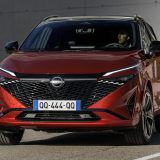Recharge Industries: All about the Australian company and its plans to save crucial Britishvolt gigafactory
How a little-known company forged a very big deal
There is fresh hope for a £3.8bn electric vehicle battery “gigafactory” in Northumberland following the announcement earlier this week that an Australian company has stepped in to rescue the collapsed project, which many believe is crucial for the future of the UK automotive industry.
After months of financial turmoil, Britishvolt entered administration in January having failed to source external investment. However, news of a deal between the administrators EY and the Australian start-up Recharge Industries has revived hopes for the factory.
The deal potentially keeps alive plans to construct the facility at Cambois, near Blyth, which had been expected to create around 3,000 jobs in the north-east of England and provide a large percentage of the UK car industry’s EV battery requirements in the next decade.

Positive as the news appears to be for the north-east and Britain as a whole, prior to its success as the winning bidder for Britishvolt, Recharge Industries was almost totally unknown in Europe. The speed at which it put together its offer for EY, and the fact that it emerged as a leading bidder, suggests there is financial clout and talent behind the firm.
Recharge was founded in 2021 with plans to begin high-voltage lithium-based battery production in Australia. It is backed by the New York-based investment fund Scale Facilitation, headed by Australian chief executive, David Collard.
Rather than developing its own battery technology as Britishvolt sought to do,Recharge instead licensed existing battery technology from American lithium-ion battery developer C4V.
Recharge has yet to begin construction of its own factory, though a site was located last August outside Geelong, a former industrial city in Victoria in the south of Australia.
While Australia is the world’s largest producer of lithium, it has few facilities at present for processing the material, something the Australian government aims to address.
As well as the considerable financial backing of Scale Facilitation, Recharge employs a crack team of personnel, including Major General Robert A. Karmazin, a former US Green Beret who has advised the president and White House chief of staff on issues relating to strategic, operational and human capital resources.
Karmazin’s clout may go some way towards explaining the speed at which the winning bid for Britishvolt was assembled.
Recharge’s successful pitch to Britishvolt’s administrators is thought to have relied in part on its ability to realise the potential of the diplomatic and defence connections between the UK, United States and Australia, as well as its plans to build batteries for military applications.
The company’s CEO Rob Fitzpatrick said in an interview last month: “The defence industry is renowned globally as an innovator and an industry that is dependent on batteries and storage for a whole suite of applications.”
According to Collard, Britain’s free trade agreement with Australia and the “Aukus” security pact should also reinforce the benefits of the deal.
Without the Recharge takeover, the company warned that the UK was leaving itself open to Britishvolt being acquired by a Chinese firm, further strengthening Chinese dominance over the EV battery manufacturing sector.
The company’s plan has received support from the UK’s trade envoy for Australia, the ex-cricketer, Ian Botham.
Although several of the unsuccessful parties bidding for Britishvolt were thought to have been interested in the company’s nickel and cobalt-based intellectual property, that is understood not to be the case with Recharge.
Britishvolt’s modular battery technology remains at a prototype stage and it has struggled to bring to production the battery cells or to even deliver samples to companies such as Aston Martin and Lotus, with which it had signed memoranda of understanding.

Collard was critical of Britishvolt’s plan to focus solely on EV battery production rather than also diversifying into energy infrastructure and said that the British firm had burnt through too much cash attempting to develop its own battery technology.
According to Collard, Recharge would probably transfer the lithium-ion technology being used at its Geelong plant to Blyth to speed up the commencement of production at the British site.
This would enable Recharge to achieve efficiencies of scale by constructing both plants at the same time.
Recharge’s existing global chain of 230 suppliers, Collard said, could be linked with the British business to accelerate its launch.
In addition to the initial plan that Britishvolt’s Blyth factory would employ 3,000 people directly, executives at the company also suggested that an additional 5,000 people would be employed in the wider supply chain.
While Recharge’s aims in that regards aren’t yet known, it does plan to source some local suppliers. Negotiations are taking place and a memorandum of understanding has already been signed with Tees Valley Lithium, which has planning permission for a £200m factory in Redcar.
The final deal could see Tees Valley supply low-carbon lithium hydroxide into Recharge’s supply chain and also potentially jointly source spodumene (an essential element for lithium-based battery production) for Tees Valley’s processing facilities.
The two firms also plan to work together on sourcing lithium spodumene for Tees Valley’s planned refinery in Port Hedland, Australia, with the silicate mineral converted into lithium sulphate there before being shipped to Teesside for processing and use in Recharge’s Blyth facility.
An important project for Britain
Recharge’s plan to revive the Britishvolt project, while being very good news for the locality, is also potentially a big deal for the entire UK motor industry.
Industry figures including Dr Andy Palmer, the former CEO of Aston Martin, have warned that the British automotive industry faces a bleak future if it doesn’t significantly ramp up battery production capacity in the coming decade, ahead of the government’s 2030 ban on the sale of new petrol and diesel cars.

“The consequences of not correcting course will be the continuing demise of our automotive manufacturing capability as car makers move to Europe or elsewhere, where battery capacity is being rapidly deployed as a matter of economic priority,” said Palmer on Twitter, following news of Britishvolt’s collapse in January.
Nissan has also said that the future of its Sunderland plant — the UK’s biggest car factory — could be in danger if the UK doesn’t focus on bolstering and rebuilding its automotive supply chain, all of which serves to underscore just how vital the success of the Recharge/ Britishvolt venture could be.
Related articles
- After reading about who Recharge Industries is, you might like to read why Nissan said its Sunderland plant has an uncertain future
- You might also be interested to read about Honda closing its Swindon factory after 35 years of car production
- And click here if you want to see our guide to all the car makers’ electric vehicle plans
Latest articles
- Dacia Duster 2024 review: Rugged, affordable SUV modernised with electrification and quite the glow up
- Audi A3 Sportback 2024 review: Softly, softly, catchy premium hatchback buyer
- New electric-only Mini Aceman fills gap between Mini Cooper hatch and Countryman SUV
- Tesla driver arrested on homicide charges after killing motorcyclist while using Autopilot
- Porsche Macan 2024 review: Sporty compact SUV goes electric, but is it still the class leader for handling?
- F1 2024 calendar and race reports: What time the next grand prix starts and what happened in the previous rounds
- Aston Martin DBX SUV gets the interior — and touchscreen — it always deserved
- Nissan unveils bold look for updated Qashqai, still made in UK
- British firm Bedeo launches new EV conversion kit for classic Defender














